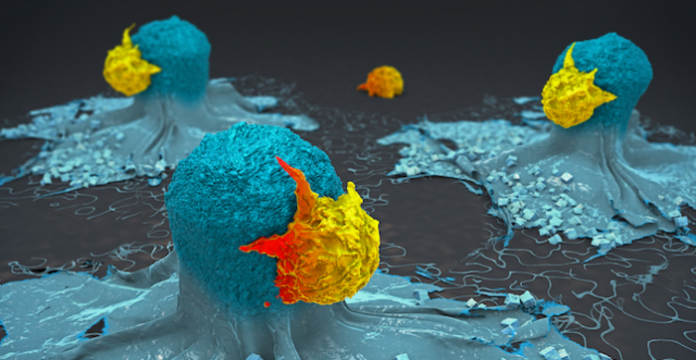
New research from investigators at Tel Aviv University details how tumor cells form temporary cell-in-cell formations to evade immunotherapy. Their findings, published in eLife, may lead to the development of treatments that combine immunotherapy with the inhibition of signaling pathways in tumor cells.
“Despite the remarkable successes of cancer immunotherapies, the majority of patients will experience only partial response followed by relapse of resistant tumors,” wrote the researchers. “While treatment resistance has frequently been attributed to clonal selection and immunoediting, comparisons of paired primary and relapsed tumors in melanoma and breast cancers indicate that they share the majority of clones.”
“Cancer immunotherapy harnesses the body’s immune system to fight cancer. Despite its remarkable success, the majority of patients who receive immunotherapy will only see their tumors shrink in size temporarily before returning, and these relapsed tumors will likely be resistant to immunotherapy treatment,” said first author Amit Gutwillig, who was a PhD student at the Carmi Lab, Tel Aviv University, at the time the study was carried out, and is now a senior researcher at Nucleai.
Using both mouse models and clinical human samples, the researchers demonstrated that tumor cells evade immunotherapy by generating unique transient cell-in-cell structures, which are resistant to killing by T cells and chemotherapies. While the outer cells in this cell-in-cell formation are often killed by reactive T cells, the inner cells remain intact and disseminate into single tumor cells once T cells are no longer present.
The team also analyzed tumors with fluorescently labeled cell nuclei and membranes. They found that the cell-in-cell formation was more prevalent in immunotherapy-treated tumors, particularly in sites associated with tumor cell death.
“This previously unknown mechanism of tumor resistance highlights a current limitation of immunotherapy,” explained senior author Yaron Carmi, PhD, principal investigator at the department of pathology, Sackler School of Medicine, Tel Aviv University. “Over the past decade, many clinical studies have used immunotherapy followed by chemotherapy. But our findings suggest that timed inhibition of relevant signaling pathways needs to occur alongside immunotherapy to prevent the tumor from becoming resistant to subsequent treatments.”













